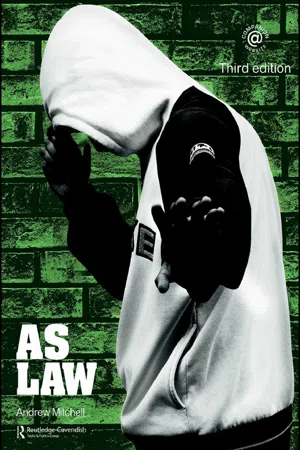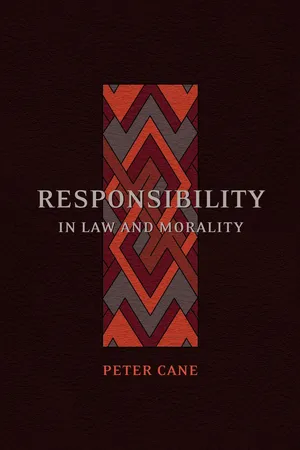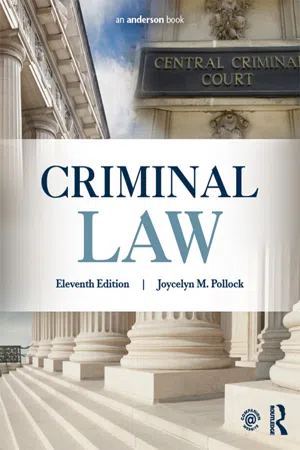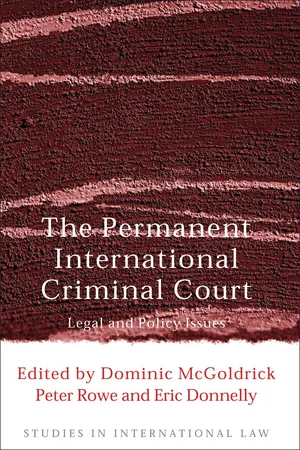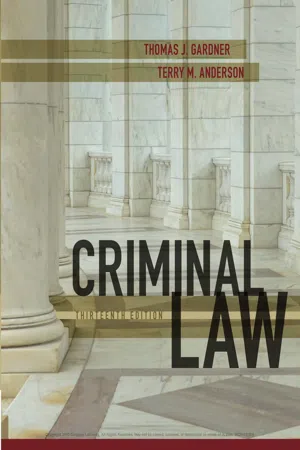Law
Criminal Liability
Criminal liability refers to the legal responsibility a person faces for committing a criminal offense. It involves being held accountable for one's actions through the criminal justice system, which may result in penalties such as fines, imprisonment, or other forms of punishment. Criminal liability is determined based on evidence and the application of relevant laws and legal principles.
Written by Perlego with AI-assistance
Related key terms
1 of 5
8 Key excerpts on "Criminal Liability"
- eBook - ePub
- Andrew Mitchell(Author)
- 2008(Publication Date)
- Routledge-Cavendish(Publisher)
12 Introduction to Criminal Liability This topic enables you:- To gain an appreciation of the main elements required to establish Criminal Liability.
- To build on earlier knowledge of the criminal courts (Chapter 6 ) and juries and lay magistrates (Chapter 9 ).
- To develop a basic understanding of one area of criminal law: the non-fatal offences against the person.
- To understand the distinction to be drawn between those offences that require mens rea and those offences referred to as strict liability.
- To provide foundations in Criminal Liability for further studies in sentencing (see Chapter 14 ) and perhaps for criminal law at A2 level.
Criminal law concerns wrongs against the State. These wrongs are seen as sufficiently serious to cause harm to society in general, and therefore the enforcement of the criminal law is sought by the State on behalf of its people. The agencies of the State that bring such cases include the Crown Prosecution Service (CPS, which prosecutes on behalf of the Police) and other bodies such as the Trading Standards Departments of local authorities (which prosecute on matters of consumer protection law).TOWARDS A FULLER DEFINITION OF CRIMINAL LAW
Most definitions of criminal law focus on two points: first, that criminal offences are perceived to be harmful to the State; and, second, that the only appropriate way of dealing with such offences is through punishment. These are harms that are seen as too serious to be left to the victim to decide whether or not to claim civil redress in the form of compensation. The search for a single definition of criminal law is, however, complicated by issues such as the law’s relationship to morality, which creates a great deal of legal debate.There is no doubt, on a simple level, that the criminal law enforces morality in its approach to matters such as murder and theft, and thus the relationship between the two certainly exists. However, this relationship is not clear-cut. The moral rule ‘thou shalt not kill’ is contained in the law only to a certain extent: is it so appropriate, for example, in cases of killings in a time of war, or killings for the purposes of necessity (such as the recent operation to separate conjoined twins, thus killing the weaker twin, in In Re A - eBook - PDF
- Peter Cane(Author)
- 2002(Publication Date)
- Hart Publishing(Publisher)
It is only in this context, too, that the financial means of the defendant are relevant to the assessment of compensation. In crim-inal law, by contrast, the offender’s means are more generally relevant to the assessment by criminal courts of monetary fines and (in England, at least) com-pensation orders. 98 This difference between the assessment of criminal and civil sanctions is, no doubt, partly to be explained by the fact that people are rarely sued civilly unless they are insured against liability or can afford to pay sub-stantial damages out of their own resources. But the agent-focus of the criminal law, and the civil law’s concern with the interests of victims, provide principled support for the different approaches to the relationship between culpability and sanctions. 3.6 RESPONSIBILITY , FAULT AND CULPABILITY So far, the discussion has skirted the issue of the relationship between responsi-bility and culpability, and that between culpability (understood as a notion belonging to the moral domain) and fault (understood as belonging to the legal domain). The time has now come to confront these issues head-on. 94 Responsibility and Culpability 95 Norrie (2000), 101–2. 96 Norrie (2000), 175–6. 97 For a more detailed discussion in relation to tort law see Cane (1998), 160–70. 98 Cane (1999), 251. 3.6.1 “Moral responsibility requires intentionality” To repeat the opening sentence of this chapter, one of the clearest and most persistent themes in philosophical discussions of responsibility is that respon-sibility requires culpability (or “blameworthiness”). 99 In such discussions, “responsibility” is typically glossed as “moral responsibility”, and culpability is commonly equated with intentionality. This produces the conclusion that moral responsibility requires intentionality. A further conclusion is sometimes then reached: to the extent that legal liability can attach to conduct and consequences that are not intentional, the law is out of step with morality. - eBook - PDF
Crimes against Humanity
Historical Evolution and Contemporary Application
- M. Cherif Bassiouni(Author)
- 2011(Publication Date)
- Cambridge University Press(Publisher)
7 The Theories and Elements of Criminal Responsibility In the law, it is not the obvious that needs to be specified, but the ambiguous that must be clarified. Introduction All criminal justice systems of the world recognize the concept of individual criminal responsibility. Consequently, individual criminal responsibility is a “general principle of law” applicable to ICL. But national criminal justice systems have developed a variety of individual criminal responsibility doctrines. The divergences that exist among families of legal systems, and within them the differences as to doctrines of criminal responsibility (and their corollary elements), make it difficult to identify among them that which would constitute “general principles of law” that could be applied to ICL. As discussed in Chapter 6, the method by which “general principles of law” can be identified in comparative criminal law makes it difficult to reach outcomes that can be ascertained with any degree of scientific validity. Although it can be asserted that the general principle of individual criminal responsi- bility exists in all of the world’s criminal justice systems, it cannot be said, for example, that membership in a group deemed criminal by operation, and based on that group’s purposes and/or actions, or other attempts to address collective responsibility, is so gen- erally recognized. The range of what legal systems include as part of individual criminal responsibility includes several models, which are essentially based on the policies of prevention and repression that a given legal system decided to select and apply. For example, some states provide for criminal responsibility of legal entities as the counterpart of physical persons. The policy supporting this doctrine is based on the fact that individuals operate legal entities and derive benefits therefrom. - eBook - PDF
- Lawrence Atsegbua, Violet Aigbokhaevbo, Sunday Daudu(Authors)
- 2022(Publication Date)
- Malthouse Press(Publisher)
Chapter 2 ELEMENTS OF Criminal Liability ELEMENTS OF Criminal Liability ELEMENTS OF Criminal Liability ELEMENTS OF Criminal Liability INTRODUCTION INTRODUCTION INTRODUCTION INTRODUCTION It is a fundamental requirement of received English law that before an accused person is convicted for an offence his guilt must be proved. There must be coincidence of the physical and mental element. These are the actus reus and the mens rea. It must, however, be pointed out that both terms are absent in the Criminal and Penal codes. 1 In R. v. Miller, 2 Lord Diplock expressed his disapproval of the use of the terms actus reus and mens rea thus: 3 My Lords, it would I think be conducive to clarity of analysis of the ingredients of a crime that is created by statute, as are the greater majority of criminal offences today, if we were to avoid bad Latin and instead to think and speak about the conduct of the accused and his state of mind at the time of that conduct, instead of speaking of actus reus and mens rea. Despite the above reservations by his Lordship, both terms are still being used in England and also in Nigeria. In justification of their continual use, Clarkson and Keating submit that: 4 We shall analyse crimes in terms of actus reus, mens rea…We do this for the simple reason that as long as one appreciates 1 See Okonkwo & Naish, Criminal Law in Nigeria, 2 nd Edit (Lagos: Spectrum, 1980) at p. 43 2 {1983) AC 161 3 Ibid., at p. 175 4 Criminal Law 7 th Edit (London: Thomson, Sweet & Maxwell, 2010) at p. 70-71. See also McAlhone & Huxley Binns, Criminal Law: The Fundamentals, 2 nd Edit (London: Thomson, Sweet & Maxwell, 2010) at p. 12 Elements of Criminal Liability 13 that these terms are no more than tools, they are tools that can usefully aid the clear exposition of the rules of criminal law. - eBook - ePub
- Joycelyn M. Pollock(Author)
- 2015(Publication Date)
- Routledge(Publisher)
As far back as common law, the law did not punish mere criminal thoughts, nor does it punish a person for his or her status. As a rule, legal liability is typically based upon an affirmative physical act by the person charged. In some instances, liability can rest upon a failure to act, if it is determined that a person had a legal obligation to act under the circumstances. This is called omission and will be discussed in § 2.4.B. Model Penal CodeThe Model Penal Code describes criminal acts and omissions in § 2.01. Specifically excluded from the definition of voluntary acts are: a reflex or convulsion; a bodily movement during unconsciousness or sleep; conduct during hypnosis or resulting from hypnotic suggestion; and a bodily movement that otherwise is not a product of the effort or determination of the actor, either conscious or habitual.18The act or the conduct that creates Criminal Liability may consist of the physical movement of a person, such as pulling the trigger of a gun or breaking into a house to commit theft, or it may consist of verbal acts—e.g., making verbal threats that induce fear in a victim. Possession can also form the basis of Criminal Liability even though it does not seem like an act, as long as the prosecutor can prove that the defendant knowingly had custody or control over the contraband.C. State Statutes, Codes, and CasesAs discussed in Chapter 1 , the statute or law cannot be vague in its description of the act or conduct that would create criminal culpability. The test as to whether the law is vague or not is reasonableness (whether reasonable people would know whether or not their conduct violates the law).1. Voluntary ActThe act must be voluntary. There have been a few cases in criminal law in which the act was deemed to be not “volitional” or voluntary on the part of the perpetrator. Examples of acts that are not considered voluntary include epileptic seizures or spasms, reflexive actions, or actions taken while sleepwalking or in some other form of “unconscious” state. In cases of sleepwalking, for instance, any acts carried out by the sleepwalker are held to be not voluntary for purposes of Criminal Liability. Note that this is not a mental illness or capacity defense, nor is it a question of mens rea— - eBook - PDF
- Joel Samaha(Author)
- 2016(Publication Date)
- Cengage Learning EMEA(Publisher)
Our conduct is what justifies punishing us. One way of expressing this point is to say that there is a voluntary act requirement in the criminal law. —RAYMOND R. CORRADO (1994, 1529) T he voluntary act requirement is called the “first principle of Criminal Liability.” You’ll learn why in this chapter. But, before we get to that, you need to be sure how the voluntary act requirement fits into the analytic framework of Criminal Liability The Criminal Act: The First Principle of Criminal Liability Chapter Outline Copyright 2017 Cengage Learning. All Rights Reserved. May not be copied, scanned, or duplicated, in whole or in part. Due to electronic rights, some third party content may be suppressed from the eBook and/or eChapter(s). Editorial review has deemed that any suppressed content does not materially affect the overall learning experience. Cengage Learning reserves the right to remove additional content at any time if subsequent rights restrictions require it. 96 CHAPTER 3 • THE CRIMINAL ACT: THE FIRST PRINCIPLE OF Criminal Liability introduced in Chapter 1. Recall the definition of Criminal Liability: “conduct that unjustifi- ably and inexcusably inflicts or threatens substantial harm to individual or public interests” (ALI 1985, MPC § 1.02(1)(a), Chapter 1, p. 14). Criminal Liability falls only upon those whose cases progress through all the following analytic steps. We express them here as questions: 1. Is there criminal conduct? If there’s no criminal conduct, there’s no Criminal Liability. If there is, there might be Criminal Liability. To determine if there is, we proceed to the sec- ond question. (See this chapter on criminal acts; Chapter 2 on “the principle of legality;” Chapter 4 on criminal intent and causation.) 2. Is the conduct justified? If it is, then there’s no Criminal Liability. If it isn’t justified, there still might not be Criminal Liability. To determine if there is, we proceed to the third question. - eBook - PDF
The Permanent International Criminal Court
Legal and Policy Issues
- Dominic McGoldrick, Peter Rowe, Eric Donnelly, Dominic McGoldrick, Peter Rowe, Eric Donnelly(Authors)
- 2004(Publication Date)
- Hart Publishing(Publisher)
Some of the arguments in favour of, and against, codification can be found in Law Commission Report 177, A Criminal Code for England and Wales vol 1, 7–11. See also J Horder, ‘Criminal Law and Legal Positivism’ (2002) 8 Legal Theory 221. the definitions of the individual crimes in Articles 5–8. Article 28 deals with command responsibility and will be returned to later. Article 25(3) provides for the vast majority of the forms of individual Criminal Liability included in the Statute, and deserves citation in full: A person shall be criminally responsible and liable for a crime within the jurisdiction of the Court if that person, (a) Commits such a crime whether as an individual, jointly with another or through another person, regardless of whether that other person is criminally responsible; (b) Orders, solicits, or induces the commission of such a crime which in fact occurs or is attempted; (c) For the purpose of facilitating the commission of such a crime, aids, abets, or oth-erwise assists in its commission or its attempted commission, including providing the means for its commission; (d) In any other way contributes to the commission or attempted commission of such a crime by a group of persons acting with a common purpose. Such contribution shall be intentional and shall either (i) Be made with the aim of furthering the criminal activity or criminal pur-pose of the group, where such activity or purpose involves the commission of a crime within the jurisdiction of the Court; or (ii) Be made in the knowledge of the intention of the group to commit the crime; (e) In respect of the crime of genocide, directly and publicly incites others to commit genocide; (f) Attempts to commit such a crime by taking action that commences its execution by means of a substantial step, but the crime does not occur because of circum-stances independent of the person’s intentions. - eBook - PDF
- Thomas Gardner, Terry Anderson(Authors)
- 2017(Publication Date)
- Cengage Learning EMEA(Publisher)
In the 1920s and 1930s, state legislatures began creating criminal laws that did not require the mental element essential to true crimes. This relatively new type of crime is called a strict liability crime, or regulatory offense. Strict liability crimes can be found in criminal laws pertaining to traffic violations, narcotics, liquor, san- itation, hunting, and pure-food requirements. In strict liability crimes, the govern- ment does not have to prove intent or purpose and must show only that the accused performed the act or omission charged or brought about the results that are alleged and shown. Most crimes have some form of mental requirement as an element of the crime. The various forms of mental requirement found in those crimes are dis- cussed in the following section. CRIMES REQUIRING PROOF OF MENTAL FAULT Before a person may be convicted of a crime that requires proof of mental fault, the government must prove the following elements beyond a reasonable doubt: uni25CF The external physical act: That the conduct or act forbidden by the law of the jurisdiction was in fact committed by the defendant. uni25CF The internal mental element: That the act or omission was accompanied by a state of mind required by the criminal statute. The Latin term actus reus (“guilty act”) is used by courts and writers to de- scribe the essential physical act, and the term mens rea (“guilty mind”) is used to describe the essential mental requirement. State statutes vary on how they define the degrees of criminal intent. That is, with respect to an element of the offense, the mental state of the defendant as to that element can have various formulations. For example, to be convicted of the crime of possession of stolen property, almost all state statutes require that the defendant have knowledge that the property was stolen.
Index pages curate the most relevant extracts from our library of academic textbooks. They’ve been created using an in-house natural language model (NLM), each adding context and meaning to key research topics.
